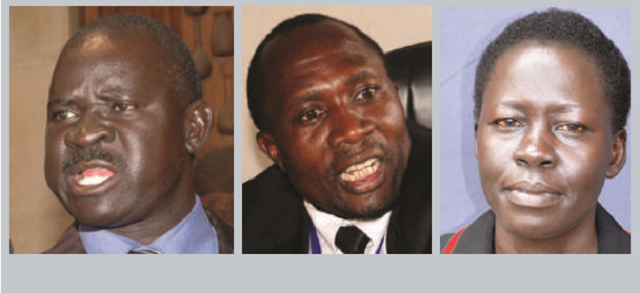
Clumsy leadership
“The committee was put in the hands of novices who can’t steer it in the right direction,” said a member of parliament’s technical staff who talked to The Independentsaid on condition of anonymity. But he said the dormancy of the committee is not entirely because of inexperienced leadership. He said leadership has also played a big role.
“The current leadership is clumsy at best. They want to dominate. Osegge chairs a meeting, Karuhanga is a lead counsel. There is very little involvement of other members in sharing the limelight. End result; the experienced ones like Maruzi county MP, Maxwell Akora and Lwemiyaga MP Theodore Sekikubo and others run away and you’re left with novices who need two or more years to understand the interrogation of audit reports.”
Former Kawempe South MP Sebuliba Mutumba who deputized Mafabi also thinks the experience and technical input of the committee leaders is key.
“Technical input of the members is paramount,” he says “For one to do well as a PAC member, more so PAC leader, they have to read thoroughly and understand the basic principles of accountancy. If you don’t read, you will never perform on PAC. You have to be familiar with the figures but most of our MPs don’t read and they also fear numbers.”
“Nandala was well-versed with these issues and I was also challenged to read a lot to catch up with him,” Mutumba adds. “And because of mainly that, we did incredibly well. There is a year in which we recovered over Shs600 billion.”
Maxwell Akora, an accountant who had been a member of PAC and most times the committee’s lead counsel since 2011 agrees. He says the committee’s leadership is the main contributor to its effectiveness or ineffectiveness.
“I think ordinarily there shouldn’t be problems with the leadership” he says, “Although Honourable Osegge doesn’t have a lot of experience in heading a committee, Gerald (Karuhanga) has been on the committee since 2011 and that provides continuity.”
But Akora says Karuhanga’s style of leadership could pose a challenge.
“He is like an activist,” he says, “He isn’t a good listener and his approach to inquiry is unsuitable. If you’re to be effective, not just as a leader of PAC but also as a member, you need to listen, read, and understand in order to ask the right questions.”
During Nandala and Alaso’s time, they appointed a lead counsel from among other members and routinely rotated. Secondly, Karuhanga is said not to understand the issues deeply. Colleagues also say he is often sentimental and ends up deviating from the audit queries to political grandstanding.
Akora has worked with three committee leaderships. He praises Wadri for always preparing well ahead of the meeting and allowing every member to contribute.
“Alaso’s tenure lacked teamwork,” he says, “She is very assertive and very strict and many members didn’t like her style, but I think she was still effective.”
Mutumba attributes the problem of incompetent committee leaders to party leaders who do not appoint leaders on merit and put members in areas that they are not conversant with.
“We have a problem as Ugandans and that problem hasn’t spared the opposition,” Mutumba says, “merit doesn’t count. You can’t bring just anybody to a committee as technical as PAC.”
Mutumba says the opposition must get “the best of its best” while selecting leaders of these accountability committees.
“These committees, especially PAC, are critical and you can’t choose its leadership based on who voted for you, who comes from where or who belongs to what religion,” he says.
Akora agrees. He says it is important to put MPs in areas where they are most competent and not appoint MPs on committees simply because they are cadres or because they voted for them.
When the leadership of Forum for Democratic Change appointed Alaso as PAC leader after party president Mugisha Muntu had defeated Mafabi, many criticised him. They said he appointed Alaso because she was his supporter.
Many thought he should have returned Mafabi to the committee because of his experience or named Akora to lead even if he does not belong to FDC. The argument here is that it would be for the good of the entire opposition.
Akora however thinks there would not be a problem with inexperienced leaders if they allowed and took guidance from experienced committee members in good faith.
“The young and inexperienced also deserve a chance to be in these leadership positions and gain the experience,” he says, “One of the reasons I decided to concentrate more on the ICT committee where I have a leadership role than PAC was because I didn’t want to clash with the new leadership.”
Akora told The Independent. “It was inevitable that I would see things differently, so I thought it was important to give them space and let them establish themselves.”
 The Independent Uganda: You get the Truth we Pay the Price
The Independent Uganda: You get the Truth we Pay the Price


